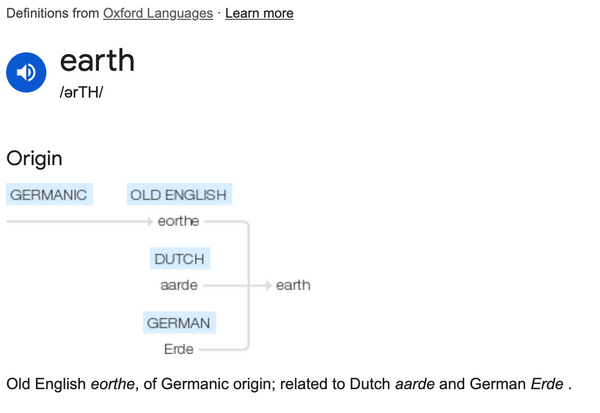Fact Check: About the Claim That No One Knows How Earth Got Its Name

Claim:
No one knows how the planet Earth got its name.
Rating:
Context:
It's true that we don't really know who decided the name for our planet in English would be "Earth," but the name makes perfect sense, as "earth" derives from an old English word for "ground." In fact, the name used for Earth in most languages has a similar meaning.
The question of who named Earth has preoccupied internet users for years. Posts on social media since at least 2015 have asked who named it or why we don't know who named it, or simply asserted that no one knows how it got its name:
In English, the name "Earth" comes from the word "earth," which means ground. The word originated from the Old English "eorthe," according to Oxford Languages:

(Oxford Languages)
Earth is related to the German "erde" and the Dutch "aarde." They all come from the Anglo-Saxon "ertha," which relates to what we walk on and what things grow on — land, dirt, ground. Germanic languages follow the rules of most languages, which refer to our planet with words that mean land or ground: Terre in French and Tierra in Spanish come from the Latin terra, which has the same meaning. Arabic has الأرض (al'ard) and Hebrew has הארץ (eretz), both of which mean land or ground. Mandarin has 地球 (dìqiú, from dí: land, qiú: global — global land).
This suggests that humans everywhere named our planet with the word for what we stand on: the ground, the land. The convention stuck.
It makes sense that the process of naming our planet would be more organic than the process of naming other planets in our solar system. The simple fact of living on it means our relationship with it is more intimate, which explains that we found words closer to us to call it.
The other planets in our solar system received their names in a different way. The tradition of naming planets after gods came not from the Romans, as many assume, but from the Babylonians. According to the Tūhura Otago Museum in New Zealand:
The Babylonians called these planets after their major gods, and their divine equivalents were assigned by the Greeks to the same planets. So Babylonian Nabu became Hermes, which comes to us as in his Roman form, Mercury; Ishtar became Greek Aphrodite and Roman Venus; Nergal became Ares for the Greeks and Mars for the Romans and us; Marduk became Greek Zeus and Jupiter for the Romans; and finally Babylonian Ninib was christened Kronos by the Greeks and Saturn by the Romans.
Interestingly, in Mandarin, all the planets through Saturn have names related to Chinese culture, while the convention for the outer planets adopts the European terminology:
The Chinese names for Mercury, Venus, Mars, Jupiter, and Saturn are derived from the Chinese concept of the Five Elements (五行), which are fire (火), water (水), wood (木), metal (金), and earth (土). The Chinese names for Uranus, Neptune, and Pluto are derived from Greek mythology, as in English.
Sources:
'Ask an Astronomer'. Cool Cosmos, https://coolcosmos.ipac.caltech.edu/ask/68-How-did-Earth-get-its-name-. Accessed 7 June 2024.
Chu, Shay. 'Chinese Names of the Planets in the Solar System'. Medium, 6 Mar. 2023, https://shaychu.medium.com/chinese-names-of-the-planets-in-the-solar-system-9ddf04bfaabd.
'How Earth Got Its Name'. Today I Found Out, 6 Sept. 2010, https://www.todayifoundout.com/index.php/2010/09/how-earth-got-its-name/.
Howell, Elizabeth. 'How Did Earth Get Its Name?' Livescience, 31 May 2022, https://www.livescience.com/32274-how-did-earth-get-its-name.html.
'PLANETS IN ANTIQUITY'. Tūhura Otago Museum, 7 Apr. 2020, https://otagomuseum.nz/blog/planets-in-antiquity/.
Why Is Earth Called 'Earth'? https://www.skyatnightmagazine.com/space-science/why-is-earth-called-earth. Accessed 7 June 2024.


